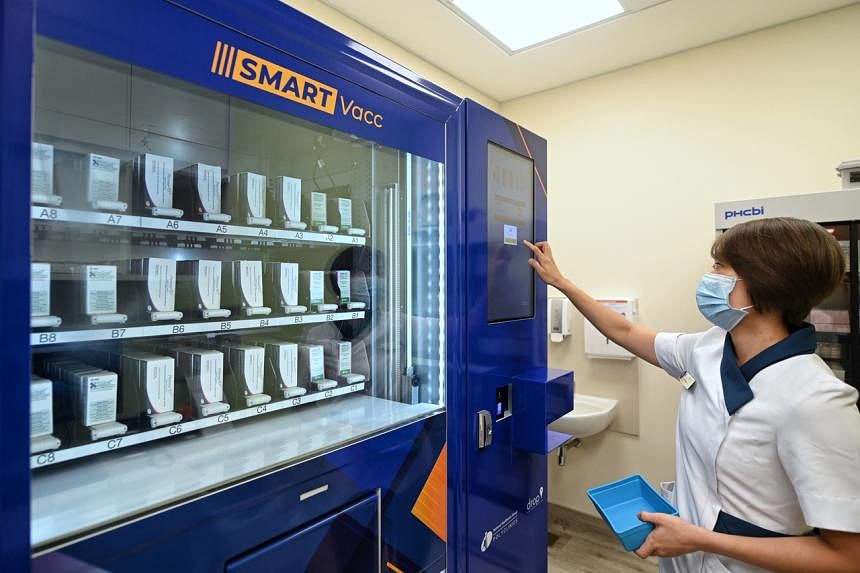New Kallang Polyclinic to empower residents to take charge of their own health
Sign up now: Get ST's newsletters delivered to your inbox
Nisha Rahim
Follow topic:
SINGAPORE - From self-service blood pressure machines to having a dedicated health studio for health workshops and exercise classes, Kallang residents can now take charge of their health and well-being by accessing a range of healthcare services at the new Kallang Polyclinic.
The services provided by the polyclinic are in line with Healthier SG, the national approach focusing on preventive health, with healthcare services provided only when needed and as efficiently as possible.
Speaking at the opening of Kallang Polyclinic on Saturday (May 7), Health Minister Ong Ye Kung said that with a new facility comes fresh opportunities to try new ways to help residents stay healthy.
"Strengthening healthcare capacity is an important part of meeting our healthcare needs in the medium to long term. But with an ageing population and deteriorating health, it is not sustainable to keep expanding healthcare capacity to treat and manage illness," he noted.
"We must work on areas of improvement that may be less pressing, but more important - which is to make ourselves healthier."
Mr Ong also highlighted how Kallang Polyclinic is the first polyclinic under the National Healthcare Group (NHG) to have a fully automated vaccine management system.
Similar to how a vending machine works, nurses can select from the different types of vaccines to the find the one required for a patient, such as a flu shot.
They can cross-check if the item dispensed is correct by scanning it with an in-built image recognition feature in the system.
Previously, nurses had to open a vaccine fridge, search for what they needed, and check for stocks.
The new system, which is in its pilot phase, has saved up to 45 minutes of nurses' time, as it monitors and reports inventory in real time compared with the manual stock-taking of the vaccines.
The aim is to enable nurses to focus more on patient care and mitigate the risks of human errors, such as administering the wrong vaccine.
Dr Valerie Teo, head of Kallang Polyclinic, said: "Now, as we are heading towards digitalisation and automation, we need to innovate especially primary healthcare, improve our efficiency and at the same time, enhance our patient safety."

The polyclinic will also be one of the first NHG polyclinics to introduce a patient advisory council, consisting of seven residents from the neighbourhood, who are also patients of the clinic.
Council member Peter Seah, 68, said he accepted the invitation to join the council because he is "able to contribute to new initiatives for the benefit of the patients and those people using the polyclinic".
Formed last year, the council has helped deliver solutions to patients.
For instance, it helped simplify instructions for the self-help blood pressure machines in the polyclinic and recommended having a dedicated holder where patients could easily place their urine samples in to speed up the collection process.
Kallang Polyclinic, which shares premises with Kwong Wai Shiu Hospital in Serangoon Road and is a five-minute walk from Boon Keng MRT station, expects to serve 1,000 patients a day.
Mr Ong said it was also a conscious decision for Kallang Polyclinic to co-locate with the hospital.
"It means day-care clients and their caregivers at the Kwong Wai Shiu Hospital Senior Care Centre can seek care at the polyclinic conveniently, without having to travel to different locations," he explained.
According to the Department of Statistics, at least one in five residents in the Kallang planning area last year was 65 years old or older.
To cater to elderly patients with complex medical and social needs, the polyclinic also has a Relationship-based Health and Social Integration programme.
Under the programme, an elderly patient is paired with a care coach who acts as a single point of contact between the individual and their clinic healthcare team to coordinate a shared care plan.
It is not only the elderly population that the polyclinic aims to support.
Another programme providing integrated maternal and child health services seeks to identify vulnerable children under the age of three from lower-income families who need medical care and financial assistance.
Dr Karen Ng, chief of clinical services at National Healthcare Group Polyclinics, said: "There are also new public housing and residential developments in the area. These will bring forth new families and usually, young families. So we see both ends of the spectrum."
Kallang Polyclinic is the 22nd polyclinic and one of three new polyclinics that opened last year. The Health Ministry plans to expand the total number of polyclinics across the island to 32 by 2030.

